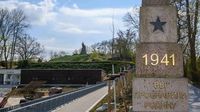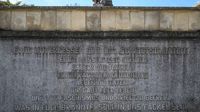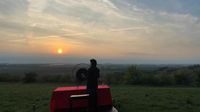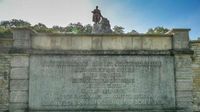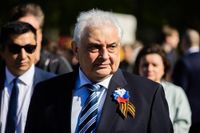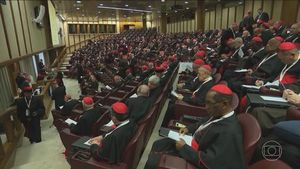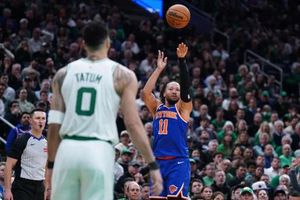In a poignant commemoration marking the 80th anniversary of the Battle of Seelow Heights, local officials and citizens gathered on April 16, 2025, to honor the fallen soldiers who lost their lives during one of World War II's final and most significant confrontations. The event, which included a wreath-laying ceremony and a silent remembrance at the memorial, was particularly notable due to the attendance of Russian Ambassador Sergej Netschajew, despite recent political tensions surrounding the ongoing war in Ukraine.
The day began with a solemn gong ceremony at 3 AM on the Krugberg, where artists and participants struck the gong continuously for approximately 87 hours—symbolizing the duration of the battle itself. The first gong was struck by 87-year-old Erika Stürmer-Alex, who recalled her childhood experiences of the war. "I remember the sounds of the bombs and the fear we lived in," she said, reflecting on the impact of the war on her early life.
As the sun rose over the Seelow Heights, the landscape bore witness to a tragic history, with more than 100,000 soldiers from various nations perishing during the fierce fighting in the winter and spring of 1945. Among the fallen were approximately 12,000 German and 33,000 Soviet soldiers, highlighting the battle's devastating toll.
Heike Mildner, a local poet and journalist who initiated the Klangaktion, expressed satisfaction with the ceremony's proceedings. "This moment is about remembrance and reflection on the past, and it is crucial that we honor those who suffered and died here," she remarked. On April 18, 2025, renowned musician Hermann Naehring is scheduled to participate in the festivities, further enriching the commemorative atmosphere.
However, the commemoration was not without controversy. The German Foreign Office had issued a statement recommending against inviting representatives from Russia and Belarus to memorial events due to the ongoing conflict in Ukraine. This directive sparked a heated debate, with many officials, including local leaders, denouncing the recommendation as absurd and nonsensical.
Sina Schönbrunn, a member of the state parliament from the Social Democratic Party (SPD), defended the invitation extended to Ambassador Netschajew. "To exclude such a representative is completely nonsensical," she stated, emphasizing the importance of maintaining a culture of remembrance that honors all victims, including civilians caught in the crossfire. "In Seelow, many civilians also died, and we must remember them too," she added.
Friedemann Hanke, the deputy district administrator, echoed these sentiments, labeling the Foreign Office's guideline as "quatsch" (nonsense). He argued that excluding a high-ranking representative from a country during a remembrance event contradicts the principles of diplomatic relations. "It's absurd to think we can build meaningful relationships while denying recognition to those who share in the mourning of their citizens," he asserted.
Simona Koß, chairwoman of the SPD in Märkisch-Oderland, underscored the significance of the commemoration in light of current events. "Eighty years after the Battle of Seelow Heights, our responsibility remains alive: remembering the immense suffering is not just a look back but a warning for the future. We stand firmly for peace in Europe and against any form of forgetting," she declared. Koß also acknowledged the strained relations with Russia since the invasion of Ukraine, emphasizing the need to distinguish between the Russian state and its people.
The commemorative events included multiple ceremonies throughout the day, starting with the opening of the Geschichtsstation Seelow at 9:30 AM, followed by the main wreath-laying ceremony at 11 AM at the memorial. This included the unveiling of name plaques for fallen Soviet soldiers and prayers led by local clergy.
As the day progressed, the somber atmosphere was punctuated by moments of reflection and solemnity. Participants from across the country came together to honor the memory of those who fought and died in the battle, recognizing the importance of collective remembrance in shaping a peaceful future.
With the backdrop of the ongoing war in Ukraine, the commemoration took on additional layers of meaning, prompting discussions about the nature of remembrance in times of conflict. Many attendees expressed hope that such events could foster dialogue and understanding, even amidst political strife.
The Seelow Heights memorial, inaugurated on November 27, 1945, stands as a testament to the sacrifices made during the battle. It serves not only as a reminder of the past but also as a call to action for future generations to prioritize peace and reconciliation.
As the sun set on April 16, 2025, the echoes of the gongs continued to resonate, symbolizing the enduring legacy of the Battle of Seelow Heights and the importance of remembering history to prevent the horrors of war from repeating.
